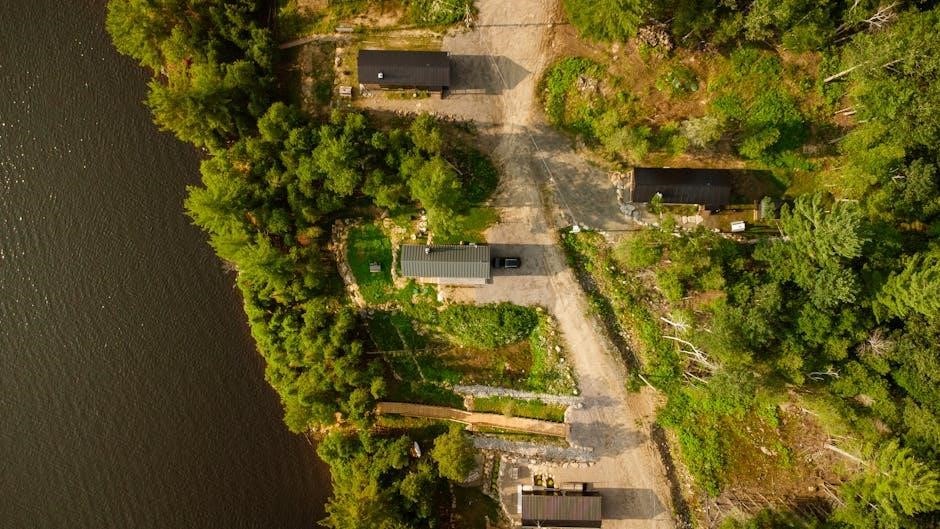A Bail de Logement is a legally binding rental agreement in Quebec, outlining terms and responsibilities for tenants and landlords. It ensures compliance with provincial tenancy laws and protects both parties’ rights.
Understanding the Importance of a Rental Agreement
A rental agreement, or Bail de Logement, is essential for establishing clear rights and responsibilities between tenants and landlords in Quebec. It ensures legal compliance, protects both parties from disputes, and provides a framework for resolving potential issues. A well-drafted agreement outlines rent, duration, maintenance obligations, and termination clauses, safeguarding the interests of all involved. Without it, both parties risk legal complications and misunderstandings, emphasizing its critical role in a harmonious landlord-tenant relationship.
Overview of Legal Requirements for Tenants and Landlords
A Bail de Logement must comply with Quebec’s tenancy laws, ensuring both tenants and landlords fulfill their legal obligations. Tenants are required to pay rent on time, maintain the property, and refrain from subletting without consent. Landlords must provide a habitable space, disclose essential information, and respect tenants’ rights. The agreement must include mandatory clauses, such as rent details, lease duration, and maintenance responsibilities. Non-compliance can lead to legal consequences, emphasizing the importance of adhering to these requirements for a lawful rental relationship.

Types of Residential Leases in Quebec
Quebec offers distinct types of residential leases, including unfurnished, furnished, and room rentals, each tailored to specific housing needs and legal requirements.
Unfurnished Lease (“Bail Non Meublé”)
An unfurnished lease, or Bail Non Meublé, is a rental agreement for an empty property, allowing tenants to bring their own furniture; It typically lasts for three years and is renewable. This type of lease is ideal for long-term stays and provides tenants with stability. The contract must include details like rent, duration, and maintenance responsibilities. Both parties sign the agreement, ensuring clarity on rights and obligations under Quebec housing laws.
Furnished Lease (“Bail Meublé”)
A furnished lease, or Bail Meublé, is a rental agreement for a property equipped with essential furniture and appliances. This type of lease is often shorter, typically lasting one year, and is ideal for temporary stays; The contract must specify the included furnishings and any additional terms. Both parties benefit from a detailed inventory to avoid disputes. This arrangement offers flexibility for tenants while ensuring landlords’ property is protected under Quebec housing regulations.
Room Rental Agreements
A room rental agreement is a contract for renting a single room within a property, often shared with others. This type of lease is ideal for tenants seeking affordable housing. The agreement typically includes the rental duration, monthly rent, and specific terms regarding shared spaces. Tenants must adhere to the landlord’s rules for common areas. A written contract is essential to outline obligations and prevent disputes, ensuring clarity for both parties in a shared living environment under Quebec’s rental regulations.

Duration and Renewal of the Lease
In Quebec, residential leases have specific duration rules. Unfurnished leases have a minimum term of three years, while furnished leases last at least one year. Renewal is typically automatic unless terminated by either party with proper notice, ensuring stability for tenants and landlords alike under Quebec’s rental regulations.
Minimum and Maximum Terms for Unfurnished Leases
An unfurnished lease in Quebec must have a minimum term of three years, providing long-term stability for tenants. The maximum term is not strictly regulated but typically aligns with the minimum, as leases automatically renew if no party objects. Tenants cannot be evicted during the lease term without valid reasons, ensuring security. Landlords and tenants can agree to longer terms, but the three-year minimum remains standard, balancing flexibility with tenant protection under Quebec’s rental laws.
Duration Specifics for Furnished Leases
Furnished leases in Quebec typically have a minimum term of one year, offering flexibility for shorter stays. These leases automatically renew unless either party provides notice of termination. The one-year term aligns with the temporary nature of furnished rentals, often sought by students or professionals. Tenants benefit from legal protections during the lease, while landlords can adapt to changing rental needs. This structure balances flexibility and stability, catering to both parties’ interests in Quebec’s rental market.
Renewal Process and Notifications
Lease renewals in Quebec require clear communication between landlords and tenants. For unfurnished leases, a notice of at least six months is mandatory if the landlord wishes not to renew. For furnished leases, this period is typically shorter, at one month. Tenants must also provide written notice if they intend to move out. Both parties should document these notifications to avoid disputes. Proper renewal procedures ensure legal compliance and maintain a smooth landlord-tenant relationship, as outlined in the Bail de Logement guidelines.

Key Clauses in the Lease Agreement
A lease must include essential clauses such as rent, charges, maintenance responsibilities, and termination terms to ensure clarity and legal protection for both tenants and landlords in Quebec.
Rent and Charges
The lease must specify the rent amount, payment terms, and due dates. Charges, such as utilities, taxes, or common fees, should be clearly detailed. Rent increases must comply with Quebec’s legal guidelines, and tenants must be notified in writing. Payment methods and late penalties, if applicable, should also be outlined. Both parties should retain proof of transactions to avoid disputes. Clarity in financial obligations ensures transparency and protects both tenants and landlords, fostering a harmonious rental relationship governed by Quebec law. Proper documentation prevents future misunderstandings.
Maintenance and Repair Responsibilities
The lease outlines responsibilities for maintenance and repairs, ensuring the property remains habitable. Landlords are typically responsible for structural repairs and major systems, while tenants handle minor maintenance. Quebec law requires landlords to address essential repairs promptly to maintain the unit’s safety and comfort. Tenants must report needed repairs in writing to avoid liability. Both parties should document agreements and completed work to prevent disputes. Clear definitions of responsibilities protect both parties and ensure compliance with Quebec’s housing standards. Regular inspections can help maintain the property effectively. Proper documentation is essential for accountability and legal compliance.
Subletting and Assigning the Lease
In Quebec, subletting or assigning a lease requires the landlord’s explicit consent, as outlined in the Bail de Logement. Tenants must obtain written permission before subletting to avoid contract termination. Subletting without approval exposes tenants to legal action. The lease must specify conditions for subletting or assignment; Tenants must provide the landlord with the subtenant’s information and ensure compliance with the lease terms. Landlords may deny requests if the subtenant fails to meet rental criteria. Both parties should document agreements to prevent disputes and ensure mutual understanding of responsibilities. Proper documentation is essential for legal compliance and clarity. Always maintain written records of any subletting or assignment arrangements to safeguard both parties’ rights under Quebec law.
Termination Clauses
Termination clauses in a Bail de Logement outline conditions under which a lease can be ended. In Quebec, landlords can terminate the lease for non-payment, breach of contract, or serious violations. Tenants must provide written notice to terminate, typically with a minimum notice period. Both parties must adhere to legal procedures, ensuring compliance with Quebec’s rental laws. The lease agreement must detail termination terms, protecting both landlord and tenant rights. Proper documentation and communication are essential to avoid disputes during lease termination. Always ensure termination clauses are clearly defined and legally compliant to safeguard all parties involved.

Obligatory Sections of the Lease
The lease must include mandatory mentions and annexes, such as rent details, tenant rights, and premises condition, ensuring compliance with Quebec rental laws and providing clarity for both parties.
Mandatory Mentions in the Contract

A Quebec rental agreement must include essential details such as the names and addresses of both parties, rent amount, charges, lease duration, deposit terms, tenant rights, and premises condition. These mandatory mentions ensure transparency and compliance with provincial tenancy laws, protecting both landlords and tenants. The contract must also outline the tenant’s responsibilities and the landlord’s obligations, providing a clear framework for the rental relationship. Proper documentation of these elements is crucial for enforceability.
Required Annexes and Attachments
Quebec rental agreements require specific attachments to ensure legal compliance. These include a premises condition report, detailing the property’s state, and a lease registration form. Additional annexes may cover appliance inventories, guarantor agreements, or special clauses. These documents, attached to the main contract, provide a comprehensive record of the rental terms and responsibilities, protecting both parties. Properly executed annexes help prevent disputes and ensure clarity in the rental relationship as mandated by Quebec tenancy laws.

Signature Requirements
The lease agreement must be signed by both the tenant and landlord to be legally binding. Married couples or co-owners may require additional signatures, ensuring mutual consent and compliance with Quebec’s tenancy laws.
Who Can Sign the Lease
The lease must be signed by both the tenant and the landlord to ensure validity. For tenants, individuals or multiple parties can sign, acknowledging shared responsibility. Landlords must sign personally or through an authorized representative. Married couples require only one spouse’s signature if they are the sole owner. Co-owners of the property must all sign the lease unless one acts with a power of attorney. This ensures mutual agreement and legal enforceability under Quebec’s rental laws.
Special Cases for Married Couples and Co-Owners
For married couples, only one spouse needs to sign the lease if they are the sole owner of the property. Co-owners, however, must all sign the lease unless one is authorized through a power of attorney. This ensures legal validity and prevents disputes. Married couples should ensure clarity on ownership status to avoid complications. Co-owners must agree unanimously, reflecting Quebec’s emphasis on mutual consent in rental agreements to protect all parties involved.

Termination of the Lease
The Bail de Logement termination process involves legal procedures, ensuring both parties follow Quebec’s tenancy laws. Formal notices and court interventions are often required to finalize the agreement.
Landlord’s Right to Terminate
Landlords in Quebec have specific rights to terminate a Bail de Logement, typically for serious breaches. Common reasons include non-payment of rent, significant property damage, or violation of lease terms. Illegal activities on the premises or unauthorized subletting can also lead to termination. The landlord must follow legal procedures, often involving formal notices and court interventions. Tenants are protected from unilateral evictions, ensuring due process is followed according to Quebec housing laws.
Tenant’s Right to Terminate
Tenants in Quebec have the right to terminate a Bail de Logement under specific conditions. They must provide proper notice, typically 60 days for furnished units or 120 days for unfurnished, depending on the lease type. Termination can occur if the landlord fails to maintain the property or violates lease terms. Tenants may also terminate due to significant changes in their personal circumstances. Written notice must be served, and tenants must vacate by the agreed-upon date to avoid legal disputes or penalties. Quebec law ensures tenants’ rights are protected during termination processes.
Procedure for Lease Termination
The termination of a Bail de Logement requires a formal process. Tenants or landlords must provide written notice, specifying the intent to terminate and the effective date. The notice period varies depending on the lease type and reason for termination. Once delivered, the parties must await the expiration of the notice period, typically 1 to 2 months. If disputes arise, either party may seek legal recourse. Proper documentation and adherence to legal guidelines are essential to ensure a smooth termination process and avoid potential conflicts or penalties.
Additional Types of Leases
Additional lease types in Quebec include fixed-term agreements and leases with a purchase option, offering tenants flexibility and potential ownership opportunities.
Fixed-Term Leases
A fixed-term lease in Quebec specifies a clear start and end date, offering stability for both tenants and landlords. This type of lease cannot be modified during its term without mutual consent. It often ranges from one to three years, providing a predictable rental arrangement. At the end of the term, the lease may transition to a month-to-month agreement or require renewal. Fixed-term leases are ideal for tenants seeking short-term commitments and landlords preferring predictable occupancy periods.
Lease with a Purchase Option

A lease with a purchase option allows tenants to rent a property while retaining the exclusive right to buy it within a specified period. A portion of the rent may be applied to the purchase price. This arrangement benefits tenants by enabling them to test ownership feasibility and build equity. The lease must detail the option’s duration, purchase price, and terms. Both parties are legally bound to these conditions, ensuring clarity and protection for all involved.
Model Contracts for Download
Download free PDF and Word templates for Quebec rental agreements, compliant with local laws. These legally vetted models offer customizable options for landlords and tenants.
PDF and Word Templates for Unfurnished Leases
Free PDF and Word templates for unfurnished leases in Quebec are widely available online. These models are specifically designed to comply with Quebec’s rental laws, ensuring legal compliance and convenience for landlords and tenants. They include essential clauses such as rent, duration, and maintenance responsibilities.
Downloadable templates are regularly updated to reflect changes in legislation, such as the Alur and Elan laws, ensuring they remain current and legally binding. They provide a clear framework for drafting an unfurnished lease agreement efficiently and effectively.
PDF and Word Templates for Furnished Leases
For furnished leases in Quebec, PDF and Word templates are available, designed to meet legal requirements. These templates include specific clauses for furnished properties, such as inventory lists and maintenance responsibilities.
They comply with Quebec’s rental laws, ensuring both landlord and tenant rights are protected. Regular updates reflect changes in legislation, providing a reliable and efficient way to create a legally binding furnished lease agreement.

Best Practices for Drafting a Lease Agreement
Drafting a lease agreement in Quebec requires clearly outlining terms, ensuring legal compliance, and including essential clauses to protect both tenant and landlord rights and obligations.
Ensuring Compliance with Quebec Laws
Quebec’s rental laws require landlords to use standardized lease agreements, ensuring all terms comply with provincial regulations. The lease must include mandatory clauses and annexes, such as the Régie du logement form, to avoid legal issues. Tenants’ rights, like rent control and eviction protections, must be respected. Landlords must also provide a written lease within 10 days of signing, outlining rent, duration, and responsibilities. Compliance ensures a legally binding and enforceable agreement for both parties.
Protecting the Rights of Both Parties
A well-drafted Bail de Logement protects both tenants and landlords by clearly outlining responsibilities and expectations. Tenants are assured security of tenure, protection against unfair evictions, and rights to maintain a habitable property. Landlords are safeguarded with clauses ensuring timely rent payments and proper property maintenance. The lease also includes provisions for handling disputes, such as required notifications for repairs or lease termination. By adhering to legal formalities, both parties can enforce their rights effectively, ensuring a fair and balanced rental agreement.
